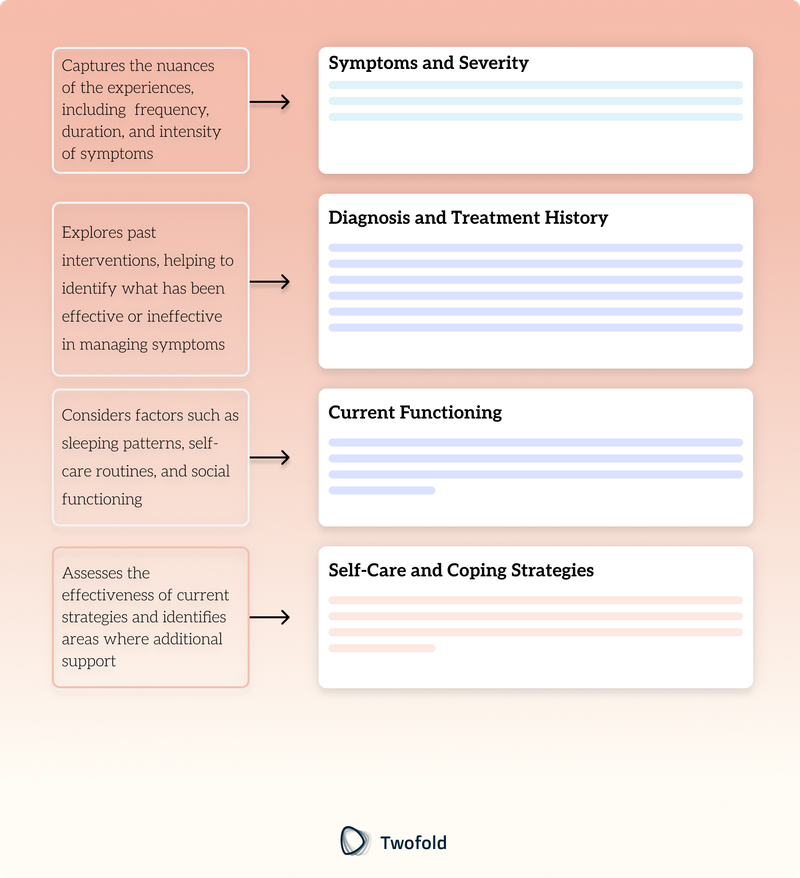
Behavioral Health Assessment Template
Key Takeaways
- A behavioral health assessment template offers a structured approach to evaluating mental health.
- It helps in identifying symptoms, diagnosing conditions, and planning treatment.
- Templates can be customized to suit individual needs, including children, adolescents, and adults.
- Essential for mental health professionals to streamline the assessment process.
What Is a Behavioral Health Assessment?
A behavioral health assessment is a comprehensive evaluation tool used to understand an individual's mental health status. It gathers information on symptoms, past history, and current functioning to aid in diagnosing mental health conditions and creating a treatment plan.
These assessments are crucial for identifying specific needs and determining the severity of conditions like depression, anxiety, and other mental health disorders. They provide a holistic view of an individual's mental health, considering factors like mood, thoughts, and behaviors.
Key Components of a Behavioral Health Assessment
A behavioral health assessment typically includes the following components:
- Personal Information: Contact details, family history, and past medical history. This section is crucial as it provides a foundation for understanding the individual's background and any hereditary factors that may influence their mental health. It also helps in establishing a connection with family members who may offer additional insights.
- Symptoms and Severity: Detailed description of symptoms and their impact on daily functioning. This section aims to capture the nuances of the individual's experiences, including the frequency, duration, and intensity of symptoms. Understanding the severity is essential for diagnosing conditions like depression and anxiety and gauging their impact on the individual's quality of life.
- Diagnosis and Treatment History: Previous diagnoses, treatments, and their outcomes. This section explores past interventions, helping to identify what has been effective or ineffective in managing symptoms. It provides a historical context that can guide future treatment decisions and adjustments.
- Current Functioning: Assessment of mood, thoughts, and behaviors. This component evaluates the individual's present mental state, focusing on how their mental health affects daily activities and interactions. It considers factors such as sleeping patterns, self-care routines, and social functioning, offering a snapshot of the individual's overall well-being.
- Self-Care and Coping Strategies: Evaluation of self-care practices and coping mechanisms. This section highlights the individual's methods for managing stress and maintaining mental health. It assesses the effectiveness of current strategies and identifies areas where additional support or new techniques might be needed to enhance resilience and functioning.
How to Use a Behavioral Health Assessment Template: Step-by-Step Process
Step 1: Gather Preliminary Information
Begin by collecting basic information about the individual, including personal details and family history. This sets the foundation for a comprehensive assessment.
Step 2: Conduct the Assessment
Utilize the template to systematically evaluate symptoms, severity, and impact on daily life. Pay attention to specific needs and tailor questions accordingly.
Step 3: Analyze and Interpret Results
Review the gathered data to identify patterns and potential diagnoses. Consider the individual's history and current functioning to develop a treatment plan.
Benefits of a Behavioral Health Assessment
Benefit | Description |
|---|---|
Clarity | Provides a clear understanding of the individual's mental health status. |
Efficiency | Streamlines the assessment process for mental health professionals. |
Customization | Can be tailored to meet the specific needs of different individuals. |
Comprehensive | Offers a holistic view of mental health, including history and current functioning. |
Example of a Behavioral Health Assessment Template
An effective template includes sections for personal information, symptom assessment, and treatment history. It guides the professional through a structured evaluation process, ensuring all relevant areas are covered.

How to Customize a Behavioral Health Assessment?
Customizing a behavioral health assessment involves adapting the template to address the unique needs of the individual. This may include focusing on specific symptoms, adjusting the format for children or adolescents, or incorporating additional sections for family input.
Stakeholders in Behavioral Health Assessments
Behavioral health assessments involve multiple stakeholders, each contributing significantly to the process. Below is a breakdown of their roles:
- Mental Health Professionals:
- Utilize assessments to accurately diagnose mental health conditions.
- Develop personalized treatment plans based on the assessment results.
- Ensure the assessment process is comprehensive and tailored to the individual's specific needs.
- Family Members:
- Offer valuable insights into the individual's past history and current functioning.
- Provide context regarding hereditary factors that may impact mental health.
- Support the individual throughout the assessment and treatment process.
- The Individual:
- Central to the assessment, offering firsthand information on symptoms and experiences.
- Shares details about their mood, thoughts, and behaviors, which are critical for diagnosis.
- Engages in the assessment process to ensure their specific needs are addressed.
Each stakeholder plays a crucial role in the assessment process, ensuring a holistic and effective approach to understanding and treating mental health conditions.
Conclusion
Behavioral health assessment templates are essential tools for mental health professionals. They offer a structured approach to evaluating mental health, diagnosing conditions, and planning treatment. By customizing these templates to meet specific needs, professionals can ensure a comprehensive and effective assessment process.
For advanced solutions in medical documentation, explore our AI medical scribe services, designed to revolutionize how you create and manage your clinical notes.
Disclaimer: This article is for informational purposes only and does not constitute legal or medical advice. Always consult professional guidelines and regulatory bodies for specific compliance requirements.
Frequently Asked Questions
Reduce burnout,
improve patient care.
Join thousands of clinicians already using AI to become more efficient.

Med Surg Template
Discover practical Med Surg templates to enhance your documentation efficiency.

Mental Health Intake Assessment Template
Discover practical Mental Health Intake Assessment templates to enhance your documentation efficiency.

Safety Plan For Mental Health Template
Discover practical Safety Plan For Mental Health templates to enhance your documentation efficiency.


